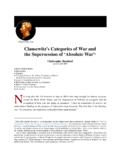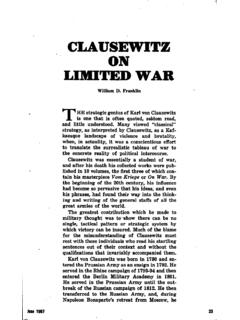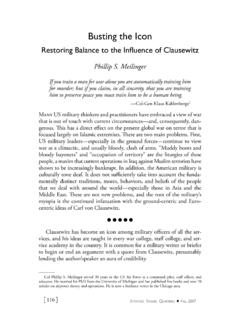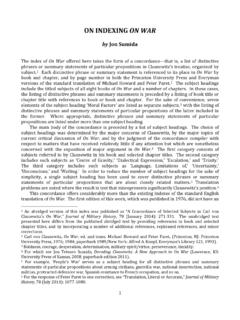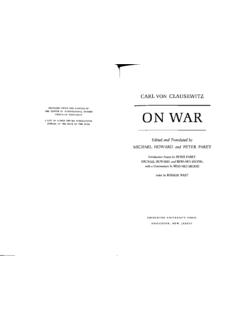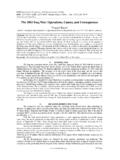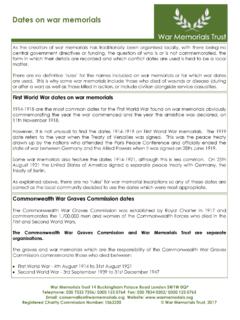Transcription of Strategic Theory and the History of War
1 Strategic Theory AND THE History OF WARDANIEL MORANNAVAL POSTGRADUATE SCHOOL Introduction: The Organization of Violence The Art of War in the Age of Reason Clausewitz and the Modernization of War Beyond the Battlefield: Sea Power Imagining Armageddon: Air Power Total War, People s War, and the Crisis of Theory Copyright Daniel Moran, 2001. All rights essay surveys the development of Strategic the-ory from its emergence in the seventeenth century throughthe era of the world wars. Although the focus is on ideas,some account is taken of changing historical circumstancesagainst which Strategic thought has unfolded.
2 The goal oftheory in any field is to improve our understanding of re-ality, and our ability to act effectively. In the case of stra-tegic Theory , the interaction between thought and action isespecially intense, because war is such an unforgiving en-terprise, and because, until recently, serious thinking abouthow war should be conducted has been confined for themost part to those responsible for waging it. Before theadvent of nuclear weapons, the work of Theory in the mili-tary field was almost exclusively the concern of practitio-ners.
3 Most have proceeded by way of historical inference,scrutinizing recent (and occasionally remote) experience insearch of an underlying logic capable of explaining result is a body of work displaying substantial intel-lectual continuity, despite much intervening technologicaland social change; but one whose basic outlook wouldeventually be called into question by the advent of nuclearweapons on the one hand, and by the rising prominence ofguerilla insurgency, terrorism, and other forms of irregularwarfare on the : The Organization of ViolenceStrategic Theory is the branch of social Theory con-cerned with the use of force to achieve the goals of onecommunity in conflict with others.
4 It aims at a systematicunderstanding of how to employ armed forces to advancepolitical, social, economic, cultural, or ideological inter-ests. War s instrumental nature its logical and practicalsubordination to objectives outside itself is in theoreticalterms its most important characteristic. The first step instrategic analysis, as Napoleon said, is to ask What is thewar about? Absent an answer or, alternatively, if theproposed answer is Nothing war becomes a maze ofatavistic bloodshed that can only be discussed in technicalterms.
5 It is because war is an organized social enterprisethat strategy, which is the calculated application of collec-tive violence for some ulterior purpose, becomes both pos-sible and most famous assertion of war's status as a meansoccurs in Carl von Clausewitz's On War, where war isidentified as a political instrument, a continuation of po-litical activity by other means politics being defined,elsewhere in the same work, as the trustee and repre-sentative of all the interests of the community. 1 It must beemphasized, however, that Clausewitz's originality as atheorist does not derive from his identification of war as apolitical instrument, but rather from his insistence thatpolitics permeates all levels of military action.
6 In itself, thenotion that war is a function of politics was already com- 1 Carl von Clausewitz, On War, edited and translated by MichaelHoward and Peter Paret (Princeton, 1976), 87, , as symbolized by the practice, popularized byCardinal Richelieu (1585-1642), of casting the words Ul-tima Ratio the final argument into the barrels ofcannon. This view of war has predominated throughout themodern era: war is the final argument of kings, as Rich-elieu would have said; and if there are no kings, then ofstates and of what is worth noting about this idea is howeasily its acceptance can relegate war to the margins ofpolitical Theory .
7 War does not loom large in the work ofJohn Locke, or Montesquieu, or David Hume, or JohnStuart Mill, or (with some qualification) Karl Marx. On thecontrary, the dominant issue in Western political thoughthas always been how to organize and legitimize powerwithin communities. That such communities would fightwith each other was obvious, but difficult to grasp analyti-cally, because the contest was so chaotic. Most writerswere content to follow Locke (and Thomas Hobbes beforehim) in envisioning the international arena as akin to thestate of nature, lacking, in Locke's parlance, a commonjudge whose authority was recognized by Warserved as a place-holder for the missing judge.
8 At the sametime, its cruel and arbitrary character illustrated what lifeoutside organized politics was like. When Clausewitzwrote in the 1820s that the natural element of war waschance, he was to some extent echoing a well-establishedunderstanding of where war fit into the larger scheme reasons why governments and individuals mightventure into the chaos of war have always been subject tomoral scrutiny. The literature on the justice of war, and ofjust conduct in war, is both more extensive and more im-pressive intellectually than that on how war can be foughtmost effectively.
9 Questions of justice and morality haveimpinged but little upon Strategic Theory , not becausemilitary theorists are necessarily indifferent to humanity,but because such external forces lie beyond the scope oftheir must be recognized that Napoleon s question, how-ever useful as a starting-point, is deceptive in suggestingthat, once war s purposes have been identified, its realitybecomes easier to grasp. This is only marginally , for instance, What is Hamlet about? There isno reasonably direct reply to this question revenge, maybe, or betrayal that will not strike anyone familiarwith Shakespeare s play as na ve.
10 Knowing that Hamletfeels betrayed, and is bent upon revenge, explains only asmall number of his actions, and then only partially. Ham-let s fate is determined by psychological and culturalforces that are remote from his conscious purposes, andbeyond his cognitive reach or Shakespeare s, for that 2 John Locke, Second Treatise of Government [1689-1704],chapter 3: Of the State of War, in Two Treatises of Govern-ment, edited by Peter Laslett, 2nd ed. (Cambridge, 1967), : Strategic Theory AND THE History OF WAR2matter, though Shakespeare s knowledge of Hamlet mustbe as close to God-like as one can the end, the question What is Hamlet about?

